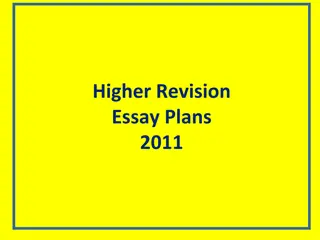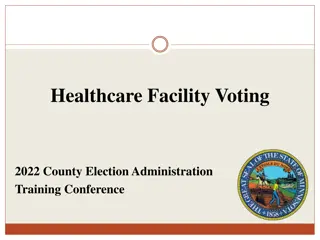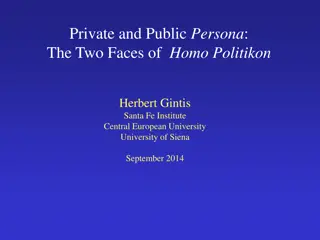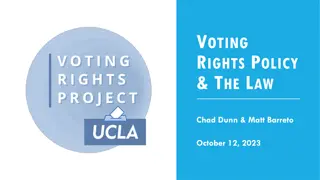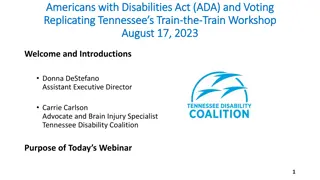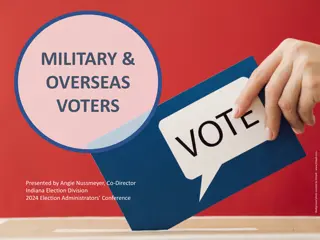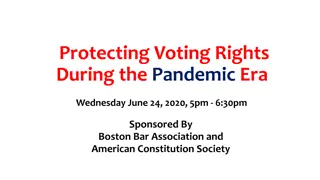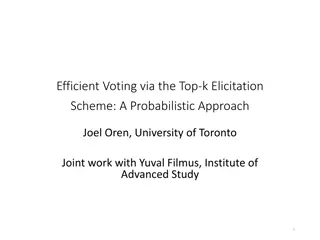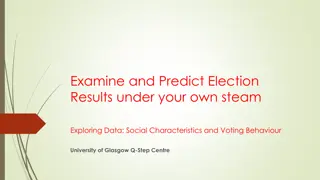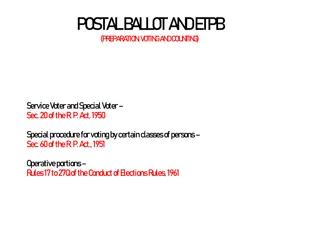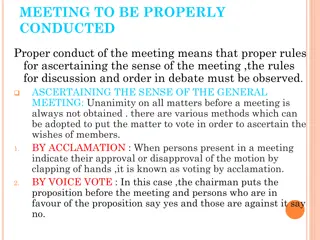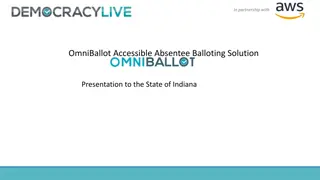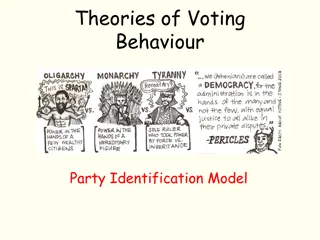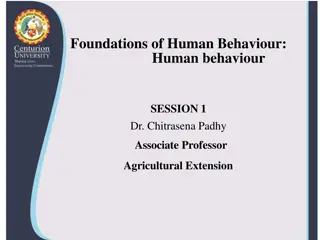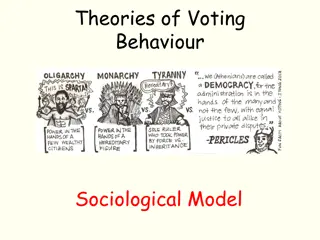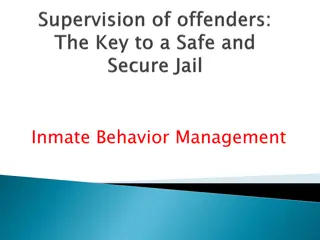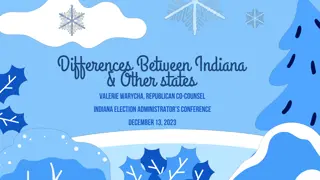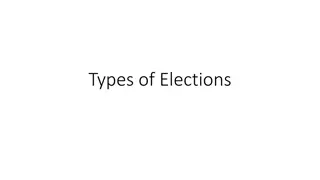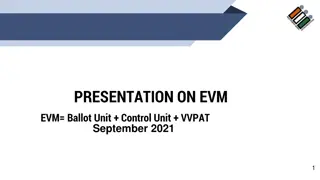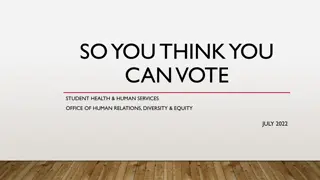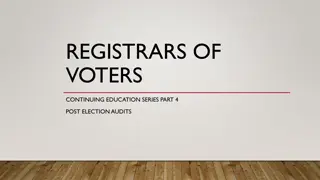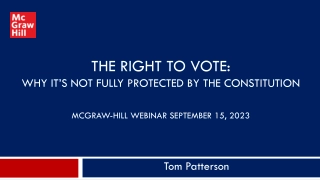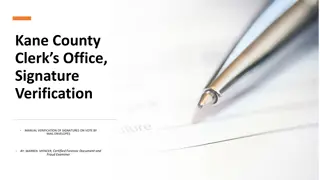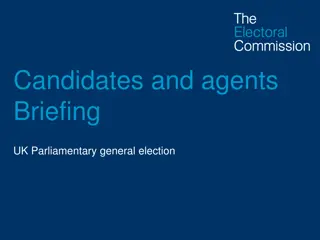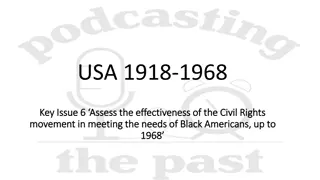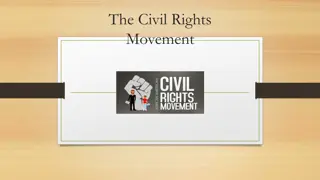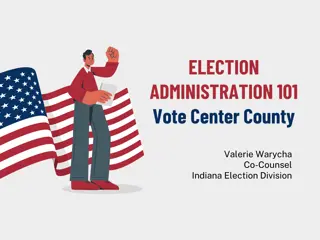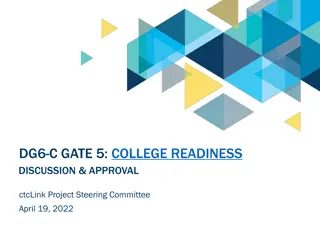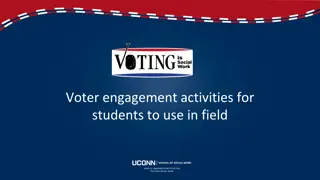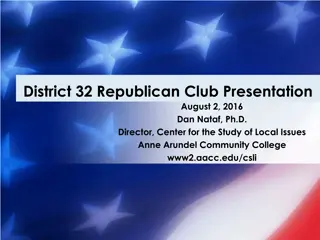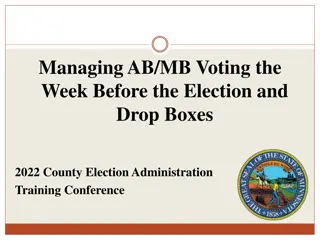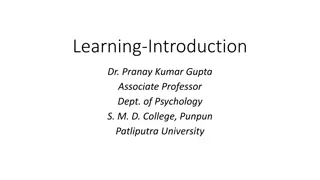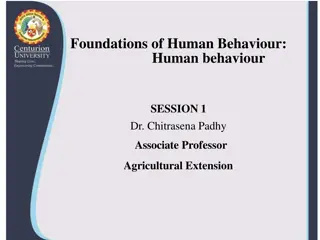Understanding Voting Behavior in the UK
Voting behavior in the UK is influenced by various factors such as social class, age, location, single issues, party leadership, and media impact. Traditionally, voting behavior was predictable, but recent trends show a shift in party loyalty. Factors such as social class have historically played a significant role in determining voting patterns, with different classes showing preferences for particular political parties. The UK has seen changes in voting behavior over the years, with an increasing number of voters willing to change their minds.
Download Presentation

Please find below an Image/Link to download the presentation.
The content on the website is provided AS IS for your information and personal use only. It may not be sold, licensed, or shared on other websites without obtaining consent from the author. Download presentation by click this link. If you encounter any issues during the download, it is possible that the publisher has removed the file from their server.
E N D
Presentation Transcript
Voting Behaviour in the UK Image result for athenian voting What effects voting behaviour?
Success Criteria I can Describe various factors which determine how an individual may vote in an election Explain why some factors are more important than others What you will learn The factors which affect voting behaviour in the UK The difference between long- term and short-term factors
What is Voting Behaviour? Voting Behaviour is the way in which people tend to vote. Political parties, think tanks, and organisations spend time and millions of pounds on analysing voter demographics, voting patterns, voting intentions etc. in order to determine the likely outcome of an election, who is voting for whom, what makes people vote one way or the other. As well as being an increasingly lucrative business it also helps parties to target voters in order to encourage them to vote for a political party or to identify issues that voters see as important. There are many complex, often inter-related, influences on why people vote the way they do.
Voting Behaviour in the UK Traditionally, voting behaviour in the UK was incredibly easy to predict. Until 1970 the two major parties averaged 91% of the vote combined in each election. However this has been in significant decline ever since. 2010 saw a historic low for combined vote of Labour and Conservative only 57% of the vote! However, in 2015 this increased to 67% again Polls show that around 30%+ of people who vote are willing to change their mind with this number increasing! Image result for voting behaviour uk Image result for voting behaviour uk
So what effects voting behaviour? Many observers have highlighted that there are several over-lapping and complex socio-economic factors which can effect the way a person votes. Generally these include: Social Class Age Location Single Issues Party Leadership/Image Impact of the Media
Social Class Social class is a measure of a person s status or position within society. For example, social class usually takes account of an individual s income, wealth, occupation, education, etc, although different classifications use different criteria. Over the years there has been a sustained and consistent pattern of class-based voting in the UK. Both north and south of the border, voters in social classes D/E have been more likely to vote Labour, eg in the 2015 general election 41% of D/E voters chose Labour. On the other hand, voters in social classes A/B are more likely to vote for the Conservatives with 45% of A/B voters voting Conservative in the general election 2015. (Source: Ipsos MORI.)
One reason to explain the close link between social class and voting behaviour is the historic differences in party policies. The Conservatives have a tradition of favouring low taxes and reduced welfare support. These types of policies appeal to wealthier people in social classes A/B who are less reliant on the state. On the other hand, Labour, and in recent years the SNP (especially in terms of Scottish Parliament or local government elections), favour policies that redistribute wealth or provide greater support. For example, higher taxes on wealthier people or higher spending on the Welfare State. These policies appeal to less well-off voters in social classes D/E. http://i.telegraph.co.uk/multimedia/archive/01819/middleclass_1819731b.jpg http://ichef.bbci.co.uk/news/625/media/images/77692000/jpg/_77692969_young_voters__walking_getty.jpg
Some commentators argue that the link between social class and voting behaviour is not as strong as it once was. With new employment patterns and changing attitudes within society, evidence suggests voters are less likely to vote according to their class than in the past. The term given to the movement away from class- based voting is de-alignment. http://pbs.twimg.com/media/BlAirr1IQAAAfdV.png:medium http://i.dailymail.co.uk/i/pix/2014/03/19/article-2584700-1C6E086900000578-935_634x336.jpg
It is clear that social class remains extremely important when voting behaviour is concerned - evidence suggests that around 40 per cent of the electorate continue to vote according to their social class which means social class remains one of the most important factors affecting voting behaviour. However, very few political analysts would suggest that social class is the only factor which is important when focusing on such a complex issue. Image result for voting 2017 Election - Who will you vote for?
Location Results from UK elections consistently show that the further north and west voters live, the less likely they are to vote Conservative. This pattern increases as an area becomes more urban. The 2015 election in particular highlighted geographical differences in voting behaviour with the SNP dominating in Scotland; however this dominance was at the expense of Labour rather than the Conservatives, who again only attained 1 MP in Scotland. Results show that the Conservatives dominated the south and south east of the UK apart from inner London. Labour was, as expected, stronger in the north and west of England
The main reasons to explain the north-south divide relate to employment, income and wealth and the rise of nationalism in Scotland. This in turn relates to social class. People in the south / south-east of the UK tend to be financially better- off as employment rates and incomes are on average higher. Therefore, people living here are more likely to vote Conservative. For people in the north / north-west of the UK (including Scotland, Wales and cities such as Liverpool and Manchester), employment opportunities and income levels are generally poorer. This may explain why people in these parts of the UK are more likely to vote for parties other than the Conservatives. http://s3-eu-west-1.amazonaws.com/nusdigital/event/logos/16257/original/polling%20station%20pic.jpg http://i.telegraph.co.uk/multimedia/archive/01612/election_1612427c.jpg
Age There is a link between age and voting behaviour. As people age they are more likely to gain promotion and be at the top of their earnings so they are more likely to favour traditional Conservative policies such lower taxation. In the 2015 general election, 47% of voters aged over 65 years voted Conservative, compared to only 23% for Labour. On the other hand, younger voters may be more concerned with issues such as greater support for education or youth unemployment which are traditionally seen as issues that Labour, and more recently the SNP, are particularly keen to tackle. In the general election of 2015, only 43% of voters between the ages of 18-24 voted, the lowest in any age category. Unsurprisingly, the highest turnout was among the over 65s with a 78% turnout. Voter apathy remains a major obstacle with only 66% of voters turning out to vote in the general election.
Single Issue Voting At election time, some voters can be influenced by a single issue.If someone s main concern is the environment they may choose to vote for the Green Party. Many voters have switched support to UKIP, who oppose the UK s membership of the European Union (EU) and want new laws on immigration. To these voters, the UK s relationship with the EU and immigration are their main concerns. http://news.bbcimg.co.uk/media/images/74359000/jpg/_74359316_021986347-1.jpg http://i.telegraph.co.uk/multimedia/archive/02280/immigration_2280507b.jpg
Issues have become more important with voters more willing to shop around big issues such as the economy, health and education and how a party addresses these can gain or lose support. Image result for brexit In 2010, 54% of people stated national issues were important to them. Rational Choice is becoming more important to many voters: what s in it for me? what party gives me the most?
In 2005 a poll showed that 54% thought the war in Iraq was a very important issue . In 2010 the main issues were: Iraq, MP expenses and unemployment The impact of this was a rare coalition government, with no one party winning an outright majority. As such, it can be said that issues dominate modern elections and can strongly influence voters. In the 2015 General election the main parties laid out their policies on the main issues which were seen to be: Healthcare Managing the economy Education As well as responding to prominent issues of the 2015 election such as immigration, and the UK s membership of the EU. http://files.stv.tv/imagebase/186/623x349/186442-nigel-farage-ukip-leader-holding-up-a-ukip-badge-at-the-launch-of-the-partys-manifesto-in-edinbur.jpg However, in an Ipsos-MORI poll, Labour led the Conservatives in 3 out of the 4 main issues. Only on managing the economy were the Conservatives seen as more popular however the Conservatives still won with a majority government! This suggests that some issues such as the economy are more important than others when voting is concerned.
Party Leadership/Image In the 21st century, the PM and election campaigns are becoming more presidential in style they are leadership focused. Therefore leaders are seen as important in influencing voters. In the 2015 general election voters believed the leaders were: Cameron: experienced, safe pair of hands ,educated, well-spoken v posh and out of touch Ed Miliband: awkward and geeky , gaff prone and unsure at times Clegg: tainted from coalition, given up on principles, everything will be ok desperation In the lead up to 2015 most of UKIP s popularity could be claimed to be based on public perception of Nigel Farage as a man of the people as he is against the establishment parties . Ed Miliband was often been portrayed as awkward and has been compared to Wallace from Wallace and Gromit http://i.huffpost.com/gadgets/slideshows/350378/slide_350378_3760627_free.jpg
For example, opinion polls suggested Prime Minister and Labour leader Gordon Brown was seen in the run-up to the 2010 general election as dour, out-of-touch and struggling to cope. However, the Conservative Party leader David Cameron, on the other hand, was seen as young, energetic and optimistic. For some political commentators, Gordon Brown s poor image cost him a considerable number of undecided voters. 2010 saw the first ever televised leadership debates again showing a move towards a more presidential style whilst also highlighting the importance of the leaders profile/personality. Nick Clegg is widely perceived to have performed best during these debates despite this the Lib Dems actually LOST seats in 2010 election.
Media (Traditional) Although no longer as influential as they once were, newspapers continue to have an influence on decision makers. In their choice of stories, use of pictures and editorials, the UK media help to set the political agenda. However, newspaper sales have been falling across the UK for a number of years - although online access of newspapers has increased. Legally, newspapers can report the news as they wish. Traditionally, most UK national newspapers have been more right- wing in their political outlook. The Daily Mail, for example, has for many years, backed the Conservative Party. To some political commentators, the largely right-wing press helps to explain the UK s greater support for right-wing political parties. There is debate as to the extent to which newspapers influence electoral success. There has been a decline in the share of people voting in line with their newspapers preference, only around 51% vote the same way as their newspaper supports.
Television remains the main source of political news for most voters. Consider what you already know about the influence of television does it influence voting behaviour? http://i4.manchestereveningnews.co.uk/news/greater-manchester-news/article8966011.ece/ALTERNATES/s615/leaders-debate-all-seven.jpg
Media (Modern) New media allows people to connect in ways not possible before i.e. following and liking it also allows for increased participation by voters as they can join political parties/volunteer/donate online. It is seen as a huge source of information people can almost find anything out! Therefore it has been identified by parties as a key way to increase accessibility e.g. Webcameron or Cameron s twitter feed etc http://www.site-seeker.com/wp-content/uploads/twitter-logo.png http://i4.walesonline.co.uk/incoming/article9145674.ece/ALTERNATES/s1200/1.jpg
However, there are dangers and pitfalls in the use of modern media; websites/twitter accounts/fake accounts can be hacked or set up. Social media can be a dangerous minefield slander on unofficial sites can do more harm than good. With councillors and MP s and even ministers having to issue apologies or resign over remarks they themselves have made on twitter. Nicola Sturgeon had to appeal to online nationalist to stop using threatening language when discussing independence online. There is also a distinct lack of trust on what people read online only 1% trust as a source of political information Older people (the most likely to vote) are less likely to use social media which may have an impact.
The influence of Social Class on Voting behaviour? As Peter Pulzer claimed in 1967 class is the basis of British Politics all else is embellishment and detail . However, as we have seen there are many other factors affecting how and why people vote. So is Social Class the basis? Issues it could be claimed that the issues people are conserved with are linked to their social class. Health and Education may have broad appeal but issues surrounding benefit cuts and austerity may affect or appeal to one social class over another, as might issues surrounding Immigration or EU membership. Location/Geography as already stated the reasons for the north/south divide relate to employment/income/wealth = class. They areas with more class AB tend to vote con, the areas with high concentration of DE, C2 tend to vote lab. Party Leader certain aspect of each party leader may appeal to different social classes. To some David Cameron is seen as a posh toff others may see him as educated. Nigel Farage attempts to appeal to the common man appears a man of the people and drinks pints.
Age The older someone becomes the more likely they are to move up the social class scale, the older the person the more likely to vote conservative. Traditional Media the type of newspaper someone reads (broadsheet guardian, FT v tabloid sun etc) or the type of television programme someone watches (Newsnight, Question Time, Panorama etc) may be influenced by their social class. Modern Media the type of websites people use, how they engage online, what they post or choose to view may be influence by both age and social class e.g. political parties official websites, or subscriptions to the guardian online v meme on Facebook! Image result for athenian voting
Round-up Questions 1. Give evidence that there has been a change in voting behaviour since the 1970 s / what % of people are now willing to change their mind between elections? 2. Which of the two social class or single issues - do you think is the most influential? Why? 3. Why could Social Class be claimed to have an influence on all other factors affecting Voting Behaviour?



